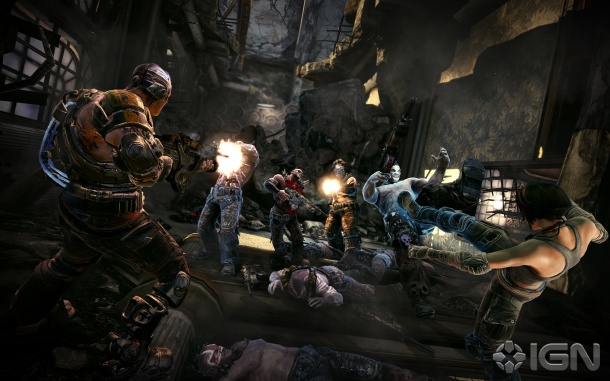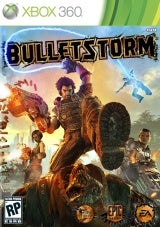Much digital ink has been spilled over Bulletstorm's perceived ability to inspire the world's youth to rape and murder anyone unfortunate enough to cross their paths, and while this definitely isn't a game for the kiddies, it's also not going to force anyone up into any bell towers with sniper rifles. In fact, Bulletstorm's story is a solid tale of loyalty, friendship, and personal responsibility, albeit one rife with dick jokes and the type of over-the-top profanity (I wish I could relate some of my favorites) that would make a sailor uncomfortable. A part of me wishes that my 13-year-old self could have played this game; he would have thought it was the best game ever.

Bulletstorm's likable hero is one Grayson Hunt, a former government-sponsored assassin who suddenly finds his conscience when he finds out his squad has been killing innocents for the nefarious General Serrano. This R. Lee Ermey clone manages to create previously unknown combinations of expletives, and utters some of Bulletstorm's funniest lines -- no small feat in a Rick Remender-penned script that's teeming with memorable one-liners. The arrogant Grayson (he's like an F-bomb-dropping Han Solo) could have been flat-out unlikable if he were put in less-skilled hands, so I was happy to find myself rooting for him to succeed as I progressed. In fact, aside from its resounding thud of an ending, Bulletstorm's narrative is one of 2011's most pleasant surprises. However, it's not the story that makes Bulletstorm such a refreshing twist on the tried-and-true shooter formula. It's the Skillshots.
Now, Bulletstorm isn't the first shooter to feature scored gunplay, in which you rack up points by killing enemies in multiples or via special means. But it is the first shooter to fully and completely integrate point-driven combat (and we're not talking about experience points here) into both its single- and multiplayer modes. The driving force behind this is the game's Skillshots, a collection of 131 special kills that you can perform over the course of your adventure. Some of these are situational, like kicking an enemy off of a cliff (Vertigo!), while others are weapon-specific. I had a tremendous amount of fun experimenting with the different Skillshots, while occasionally popping into the menu to view the ones that I hadn't pulled off yet. I definitely found some favorites (I loved the Torpedo, in which I slid across the ground and shotgun-blasted an enemy right before hitting him), but Bulletstorm encourages and pushes experimentation in a pretty ingenious way.

The primary inventory in all shooters is, ultimately, ammunition. Without bullets, you're not getting very far, and Bulletstorm's entire inventory system is based around the idea that you can't purchase bullets or improve your weapons without pulling off Skillshots (or, as the old adage says, "you have to spend money to make money"). This Skillshot/points/ammo cycle is elegantly implemented and keeps the gunplay feeling fresh by offering up full points for the first time you pull off a Skillshot, and fewer for subsequent times. I found myself eagerly hopping into the menu to find the next batch of points, or expending extra ammo just to get the more difficult shots with a particular weapon, but this is where Bulletstorm could ultimately end up angering some people. By putting such a heavy focus on strategy (and the player's ability to pull off challenging shots), the developers at Epic Games have made something that isn't for everyone, but will reward anyone willing to embrace its particular brand of lunacy.
In addition to an addictive solo scored mode called Echoes (which allows you to compare your best scores with your friends), Bulletstorm features a cooperative multiplayer mode. Anarchy is just that, as four players must jointly earn enough points to progress through increasingly more difficult rounds of enemies. The kicker is that certain enemies have to be killed with a friend (for instance, one might need to leash the enemy while the other kicks him into a spiked wall), and successfully pulling these off is essential to moving on in later rounds. Perhaps not surprisingly, I found much more enjoyment playing with friends than I did with strangers online, as communication and teamwork were paramount. I encountered plenty of griefers and quitters that cared more about their own stats than having a good time; it's a shame, as Anarchy mode really can be fun with the right people.
Bulletstorm isn't for everyone, but it's definitely one of the most unique shooters I've played in some time. The combination of its over-the-top story and inventive, addictive gameplay make it a memorable experience from start to finish. Most of all, it's downright fun -- something lacking in too many games these days.





 Outstanding!
Outstanding!


